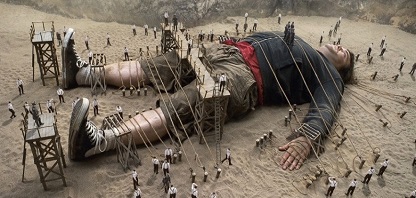The Last Days of the Lilliputians

In Gulliver's Travels the tiny Lilliputians attacked the much larger Gulliver while he was sleeping and tied him to the ground with thousands of threads. In a similar way the ruling elite have tied the working class in bondage. Small in number but great in power, the elite have designed myriad mechanisms of control to hold the much larger working class down and force it to work for them. These include institutions such as mainstream politics, media, schools, labor unions, police, courts, military, and patriarchal gender roles. They also include emotionally laden concepts such as rugged individualism, a false image of socialism, and the very way we conceive of social class.
This last, the encultured view of ourselves, robs us of our class identity. Very few of us consider ourselves working class. The term has been made to seem a musty relic of the nineteenth century, synonymous with lower class, a disreputable band of losers who are to be feared and perhaps pitied, but certainly not to be identified with. Instead we are offered a hierarchy of many classes: upper, upper middle, middle, lower middle, and last and certainly least, the lumpen lower. Within these we are fragmented further by conflicting differences: ethnic, religious, gender, life style. We're supposed to identify with our niche and our job and to strive to move up or at least not slip down in the hierarchy. But more and more of us are slipping down, losing the few securities we had. In our bewildered anger we find allies only within our isolated niche, so our struggles are ineffective.
Almost all of us are in fact working class. Everyone in the world who has to work for someone else for the essentials of living is working class. Only when we join together in solidarity will we succeed.


























